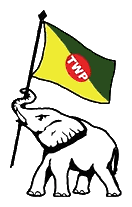
Politics of Liberia takes place in a framework of a presidential representative democratic republic modeled on the government of the United States, whereby the President is the head of state and head of government; unlike the United States, however, Liberia is a unitary state as opposed to a federation and has a pluriform multi-party system rather than the two-party system that characterizes US politics. Executive power is exercised by the government. Legislative power is vested in both the government and the two chambers of the legislature.

The President of the Republic of Liberia is the head of state and government of Liberia. The president serves as the leader of the executive branch and as commander-in-chief of the Armed Forces of Liberia.
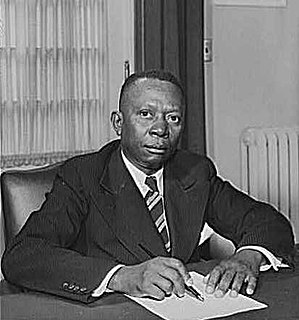
William Vacanarat Shadrach Tubman was a Liberian politician. He was the 19th President of Liberia, serving from his election in 1944 until his death in 1971.

Garretson Wilmot Gibson was the 14th President of Liberia from 11 December 1900, to 4 January 1904. Born in Maryland, in the United States, his family emigrated to Liberia in 1845. After receiving an education in mission schools, he returned to Maryland to study theology. Ordained a priest, he served as rector of the Episcopalian Trinity Church in Monrovia. He also served as Chaplain of the Liberian Senate. Later, he served as President of the Trustee Board of Liberia College and at one time President of the College.

The 1997 Liberian general election was held on 19 July 1997 as part of the 1996 peace agreement ending the First Liberian Civil War. The presidency, as well as all seats in the House of Representatives and the Senate were up for election. Voter turnout was around 89%. Former rebel leader Charles Taylor and his National Patriotic Party (NPP) won the election by a substantial margin; Taylor won 75.3% of the vote in the presidential election, whilst the NPP won the same number of votes in the parliamentary election. Taylor was inaugurated as president on 2 August 1997.

General elections were held in Liberia on 15 October 1985. These were the first elections since the 12 April 1980 military coup that brought Samuel Doe to power. During 1984, a new draft Constitutional referendum was approved, which allowed a 58 member civilian and military combined Interim National Assembly, headed by President Samuel Doe. The ban on political parties were lifted and four parties, namely, the President's National Democratic Party of Liberia, Liberian Action Party, Unity Party and Liberia Unification Party were in fray.

The Legislature of Liberia is the bicameral legislature of the government of Liberia. It consists of a Senate – the upper house, and a House of Representatives – the lower house, modeled after the United States Congress. Sessions are held at the Capitol Building in Monrovia. Legislature of Liberia is considered one of the three branches of government based on the Article III of the Constitution of Liberia that stipulates all three branches ought to be equal and coordinated based on the Principle of checks and balances.

William David Coleman was an American-born Liberian politician. A True Whig Party member, he was the 13th President of Liberia, serving from 1896 to 1900. Immigrating to Liberia in 1853, he worked his way up to election to the House of Representatives and served as Speaker of the House of Representatives from 1877 to 1879. Later he served in the Senate and then as Vice President before assuming the Presidency when Joseph James Cheeseman died in office.

The Vice President of the Republic of Liberia is the second-highest executive official in Liberia, and one of only two elected executive offices along with the President. The Vice President is elected on the same ticket with the president to a six-year term. In the event of the death, resignation or removal of the president, the Vice President ascends to the presidency, which he or she holds for the remainder of their predecessor's term. The Vice President also serves as the President of the Senate and may cast a vote in the event of a tie. The current Vice President is Jewel Taylor, serving under President George Weah. She began her term on January 22, 2018.
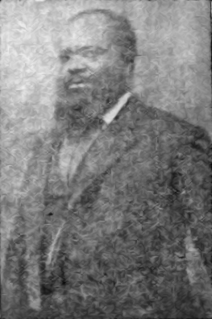
Joseph J. Ross served as the 14th Vice President of Liberia from 1898 to 1899. He also served as Attorney General of Liberia under three separate administrations and was thrice-elected to the Senate of Liberia as a senator from Sinoe County, serving as President pro tempore of the Senate from 1892 to 1896.
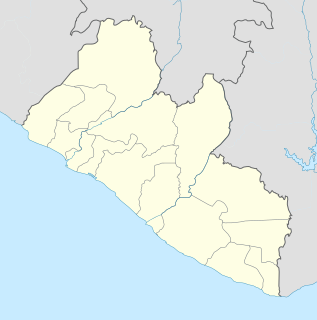
Clay-Ashland is a township located 10 miles (16 km) from the capital city of Monrovia in Liberia. The town is in the St. Paul River District of Montserrado County. It is named after Henry Clay — a slaveowner and American Colonization Society co-founder who favored gradual emancipation — and his estate Ashland in Lexington, Kentucky.
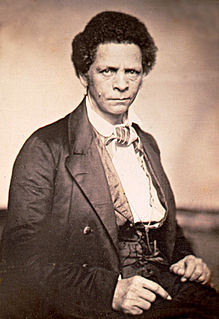
General elections were held for the first time in newly independent Liberia on 27 September 1847, alongside a constitutional referendum. The result was a victory for Governor Joseph Jenkins Roberts of the Pro-Administration Party, who defeated Samuel Benedict of the Anti-Administration Party. In a separate vote, Nathaniel Brander was elected Vice President.

General elections were held in Liberia in 1897. In the presidential election, incumbent William D. Coleman of the True Whig Party was elected. The former Vice-President had originally taken office following the death of President Joseph James Cheeseman in November 1896.

General elections were held in Liberia in 1899. In the presidential election, incumbent William D. Coleman of the True Whig Party was re-elected for a second full term.

General elections were held in Liberia in 1901. In the presidential election, incumbent Garreston W. Gibson of the True Whig Party was elected for the first time, having originally taken office after the resignation of William D. Coleman in December 1900. He defeated Coleman, who ran on the People's Party ticket.

General elections were held in Liberia in 1903. In the presidential election Arthur Barclay of the True Whig Party was elected. He defeated former President William D. Coleman, who ran on the People's Party ticket. Barclay took office on 4 January 1904

General elections were held in Liberia on 1 May 1951, the first to be held under universal suffrage, as previously only male descendants of Americo-Liberians had been allowed to vote. This was the first elections in Liberia where women and the local Liberians owning property were allowed to vote based on a Constitutional Referendum in 1945–46. In the presidential election, William Tubman of the True Whig Party was the only candidate, and was re-elected unopposed.

General elections were held in Liberia on 7 October 1975, alongside a simultaneous referendum on presidential term limits. In the presidential election, incumbent William Tolbert of the True Whig Party was the only candidate, and was re-elected unopposed. In the legislative elections True Whig Party candidates won all 71 seats in the House of Representatives and all 18 seats in the Senate unopposed. Voter turnout was around 80%.
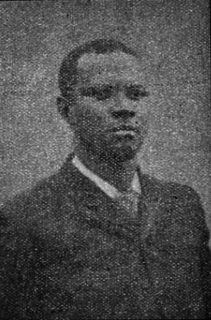
Joseph D. Summerville served as the 15th Vice President of Liberia from 1902 until his death in 1905 under Presidents Garretson W. Gibson and Arthur Barclay, making him the only person to serve as vice president under two separate presidents.



